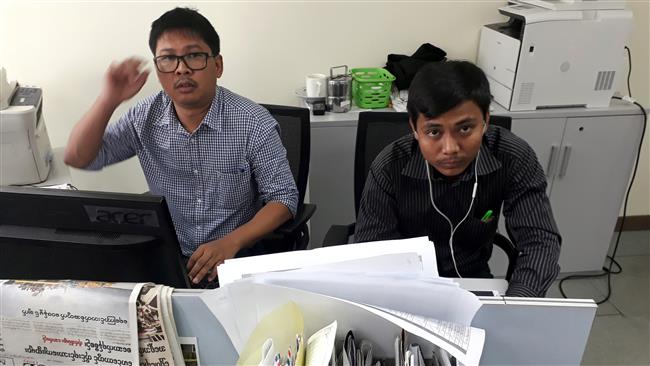Protest campaign launched in Myanmar over arrest of journalists
A group of journalists in Myanmar has started a campaign to protest the government’s detention of two journalists covering state-sponsored violence against minority Rohingya Muslims in the country’s west.
The Protection Committee for Myanmar Journalists said in a statement that its members would be wearing black T-shirts on Saturday in protest at the arrest of two Reuters reporters accused of violating the country’s Official Secrets Act.
The group, which consists of local reporters and has demonstrated against the prosecution of journalists in the past, said the black T-shirts would “signify the dark age of media freedom” in Myanmar.
The committee called for the unconditional and immediate release of the two reporters, Wa Lone, 31, and Kyaw Soe Oo, 27.
The protest campaign was launched as pressure across the world has built on the government in Myanmar to release the pair.
Wa and Kyaw were arrested last week after they were allegedly invited to dine with police officers on the outskirts of Yangon, the Southeast Asian country’s largest city.
The Ministry of Information in Myanmar claimed in a statement that the two journalists had “illegally acquired information with the intention to share it with foreign media,” and released a photo of the pair in handcuffs.

The ministry also said the reporters were being investigated and would face charges under a section of Myanmar’s colonial-era Official Secrets Act, which carries a maximum prison sentence of 14 years.
The Reuters news agency called for the immediate release of the journalists.
So did United Nations (UN) chief Antonio Guterres.
President of the European Parliament Antonio Tajani also called on Myanmar to protect media freedoms and release the two journalists.
Myanmar has barred foreign groups and reporters from entering Rakhine State in western Myanmar, where the minority Rohingya Muslims have been subject to horrific violence under military siege since late last year.
More than 600,000 Rohingya Muslims have sought sanctuary in neighboring Bangladesh since August 25, when the government-sanctioned military crackdown in Rakhine intensified.

During the past three months, government troops have been committing rapes and killings, making arbitrary arrests, and carrying out mass arson of houses in hundreds of predominantly Rohingya villages in the restive state.
The UN has already described the Rohingya as the most persecuted community in the world, calling the situation in Rakhine similar to “a textbook example of ethnic cleansing.”
'Israel booby-trapped walkie-talkies, pagers years before Lebanon blasts'
Gaza Health Ministry calls for urgent intl. help to protect hospitals amid Israeli genocide
Stakes involved in Iran’s partnership with Eurasian Union
VIDEO | Press TV's news headlines
Iran says ‘ready’ to reopen embassy in Syria, holds talks with Damascus
VIDEO | 12 people killed in ammunition factory blast in northwest Turkey
Iraq’s PMU masses resistance forces on border with Syria amid mounting concerns
Israel killed over 700 athletes in Gaza since October 2023











 This makes it easy to access the Press TV website
This makes it easy to access the Press TV website